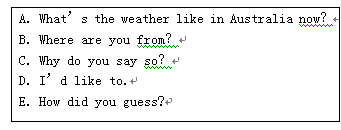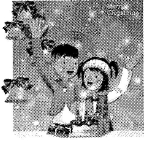题目内容
| when home happy be so his spend with park on |
Among them, there 小题5:a homeless boy Bruce. He was about eight years old and he lost 小题6: parents in a car accident, 小题7: he couldn’t go to school. When I asked him, “Do you like to school?” He said yes. We decided to take him 小题8: and let him go to school. The boy was happy to live 小题9: us.
From that day on, little Bruce became our son and went to school 小题10:.
小题1:spent
小题2:park
小题3:on
小题4:when
小题5:was
小题6:his
小题7:so
小题8:home
小题9:with
小题10:happily
试题分析:本文叙述了作者的他的丈夫经常去他家附近的公园,并且给公园里无家可归的人带去一些食物。作者看着他们吃我们的东西时,我感到很高兴。当作者得知无家可归的男孩布鲁斯想上学时,把他带回了家,让他去上学。从那天开始,小布鲁斯成了我们的儿子,快乐的去上学。
小题1:此处缺少谓语,根据Last Monday,可知此处用一般过去时,根据短语spend some time 度过一段时间,故此处为spent。句意:上个星期一,我和我的丈夫在紧挨着我家的公园度过了一段时间。
小题2:根据in the park next to our house.可知公园就紧挨着我们家,因此我们经常去这个公园。故此处为park。句意:我们经常去这家个公园。
小题3:根据短语on the benches在长椅上,故此处用介词 on。句意:他们有时呆在长椅上。
小题4:前后两个句子之间缺少连词,结合句意,故用连词when。句意:当我看着他们吃我们的东西时,我感到很高兴。
小题5:因为主语是a homeless boy 单数形式,故谓语为was。句意:在他们中间有一个无家可归的小男孩布鲁斯。
小题6:此处修饰名词parents,故用形容词性物主代词his。句意:他大约八岁,在一次车祸中他失去了他的父母。
小题7:根据 he lost parents in a car accident,可知他没有父母,没钱上学,因此此处表示结果状语,故用连词so。句意:所以他无法上学。
小题8:根据The boy was happy to live us.可知这个小男孩很高兴和我们住在一起,故此处我们把他带回了家,故为 home。句意:我们决定把他带回家。
小题9:根据短语live with sb.“和某人住在一起”,故此处用介词with。句意:这个小男孩很高兴和我们住在一起。
小题10:此处修饰动词短语went to school故用副词happily。句意:从那天开始,小布鲁斯成了我们的儿子,快乐的去上学。

练习册系列答案
相关题目


